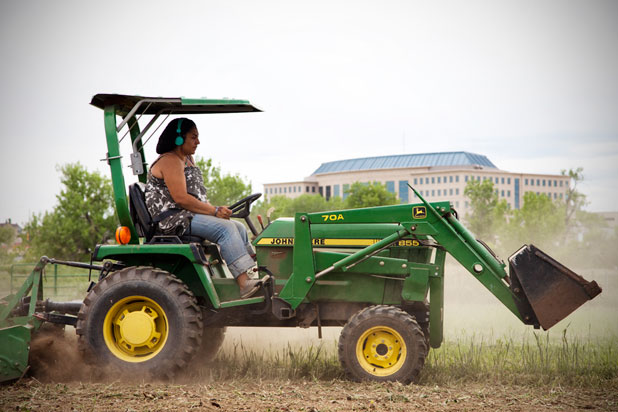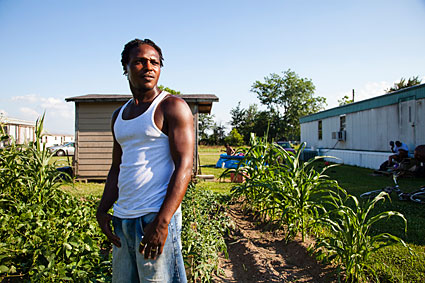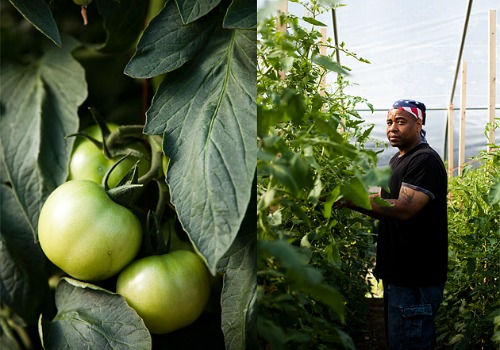January 2011 update: Many of the photos have been removed from this series so they can be published in a Breaking Through Concrete book, forthcoming this year from UC Press.
We drive south down Route 61 (aka The Blues Highway) in Mississippi, finding Dorothy and Owen Gradey-Scarbrough after church and Sunday Supper.
Dorothy and Owen stay beside Country Road 32, a half-mile and one left turn out of downtown Shelby. They live in a simple one-story ranch house with similar homes on either side. Yellow-green coco grass covers the front yards, with the greater landscape a mono-color green of soybean or corn. This is the Mississippi Delta, home of the Harvard of high-tech agriculture research stations (the USDA’s Delta States Research Center in Leland/Stoneville), and to the highest rates of diabetes, hypertension, and heart disease in the nation.
Dorothy believes one of the solutions to these communities’ health issues lies in the backyards and side-yards and churchyards. Behind the Gradey-Scarbrough’s house lies part farm, part folk-art installation. On one acre, Owen and Dorothy raise rabbits (in cages suspended over a compost pile), chickens, and a few goats that climb up and down the upturned baptismal tub that welcomed both Dorothy and Owen into the church as infants.
Peaches, plums, apples, and pear trees offer occasional shade and their trunks support a series of life-size hip-hop celebrities (50 Cent, Beyonce, Eminem) on wood paintings salvaged from a shuttered juke joint. There are rows of okra, butter beans, squash, cucumber, spinach, watermelon, grapes, lavender, lemon balm, oregano, basil, sage.
And, of course, tomatoes.
“Back in the day, you could find tomatoes out there in the cotton fields,” Owen says. “You just go pick you a tomato, brush it off, and eat it right there. We used to pick okra in the middle of the cotton field. They’d just grow wild. Now they’re spraying this stuff and killing it out. I used to like walking through those fields.”
Dorothy and Owen, like most Delta residents over the age of 50, grew up on sharecropper farms. They chopped rows of cotton for 12 hours a day and made $3 to $12 for the work. The families never got ahead. That’s just how it worked until they started leaving for city jobs in the north.
“There was no option but to work in the fields,” Dorothy says. “That’s why a lot of people left the south — to get away from the fields.”
“To get away from this,” Owen holds out the hoe he’s been leaning on. “I did. Moved to New York and didn’t come back ’til I met this lady.”
Dorothy has been backyard gardening for almost 20 years. What began as a gift of chickens from Heifer International to Dorothy and Shelby has become the next satellite demonstration garden for a national movement aimed at teaching individuals about backyard and community gardening. In a town as small as Shelby, people notice and people listen to someone as strong, proud, and rooted as Dorothy, especially when she speaks through the 10 churches in town. But even the churches hesitated back in the mid ’90s.
“The churches weren’t ready [for farming/gardening],” she says. “Our minister said, ‘Isn’t that what we’re getting away from?’ I said, ‘We’ve already gotten away from it.’ It’s been a lost art. I tell them now it has nothing to do with sharecropping. It’s for you. It can save you money and can make you money when you sell at market. This isn’t working in the fields. This is bettering your family and your health. People are getting into it.”
And Dorothy’s ripples reach outside of Shelby. Will Allen of Milwaukee’s Growing Power organization, a national leader in the urban farm movement (see Grist’s coverage), has christened Dorothy and her MEGA operation (Mississippians Engaging in Greener Agriculture) as its first Regional Outreach Training Center in the country.
We meet Richard Coleman, the county supervisor, at his ranch house in town. The family crowd is just leaving from their Sunday supper — a big one since there was a birthday.
Richard shows us his plot out back, about 120 feet by 50 feet and full of okra, squash, butter beans, peas, tomatoes.
“I just sit indoors in an office,” he says. “I didn’t know what sweat was. So it’s a twofold thing for me — it provides vegetables for my family and a pastime for me. I’ve already lost ten pounds this season. And you have to travel to Cleveland south or Clarksdale north to get what you need and that gets expensive, just with gas bills. It’s no comparison to get it right here.”
About 20 yards away, a smaller plot of the same produce thrives in a small square amid the coco grass. A dozen kids stay cool in a large inflatable pool nearby. Sean Jefferson walks over.
Sean’s 32 years old and lives in the trailer next to Richard’s home. He works at Nature’s Catch, a bass-raising plant in Clarksdale, 20 miles north. His wife and four kids stay in the trailer with his mom and stepdad.
“My grandfather used to raise food,” he tells us. “I was about 11 or 12 when I had my first garden. I try to grow one every year. I usually just shovel it out but this year I tilled it. It cost me about $7 or $8 for seeds plus one bag of fertilizer. I grew it all from seed except for the tomato plants — bought those at a nursery.”
He tends to it every day. Comes home after work and chops a little bit, does it all by himself.
We visit a few other gardens. Louise, Dorothy’s sister, shares a long row with two other gardeners. She describes some of the local lingo: “choppin’” means weeding down the rows with the hoe. “Rippin’ and runnin'” means staying busy and getting things done. Nearby we see the Shiloh Baptist Church’s garden, where members of the church work a rotational schedule to grow produce that’s available for pick-up from the church fridge.
And our final stop takes us to Cornelius Toole’s rambling property down in Mound Bayou, five miles south of Shelby. It’s like the backyard, down-home version of Stoneville’s Big Ag experimental research station.
Maybe an answer to the Delta’s and the nation’s food deserts lies somewhere here among Toole’s mad-farmer-scientist laboratory of tilapia tanks, hand-built backyard irrigation pipes, chicken coops, greenhouses, and one huge, faded-green John Deere sinking into the weeds.


